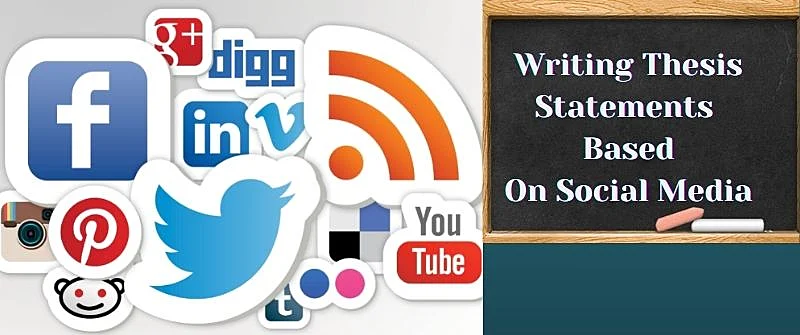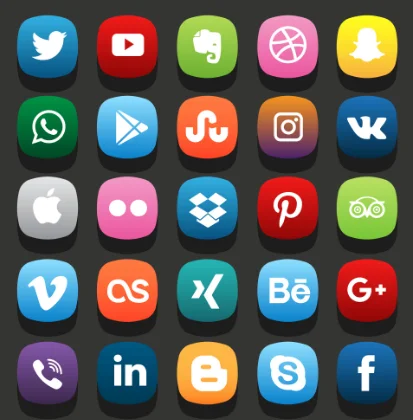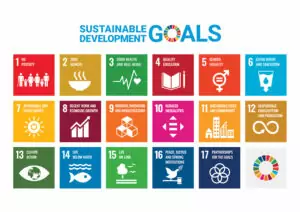- Learning Tips
- Exam Guides
- School Life

Thesis Statements about Social Media: 21 Examples and Tips
- by Judy Jeni
- January 27, 2024

A thesis statement is a sentence in the introduction paragraph of an essay that captures the purpose of the essay. Using thesis statements about social media as an example, I will guide you on how to write them well.
It can appear anywhere in the first paragraph of the essay but it is mostly preferred when it ends the introduction paragraph. learning how to write a thesis statement for your essay will keep you focused.
A thesis statement can be more than one sentence only when the essay is on complex topics and there is a need to break the statement into two. This means, a good thesis statement structures an essay and tells the reader what an essay is all about.
A good social media thesis statement should be about a specific aspect of social media and not just a broad view of the topic.
The statement should be on the last sentence of the first paragraph and should tell the reader about your stand on the social media issue you are presenting or arguing in the essay.
Reading an essay without a thesis statement is like solving a puzzle. Readers will have to read the conclusion to at least grasp what the essay is all about. It is therefore advisable to craft a thesis immediately after researching an essay.
Throughout your entire writing, every point in every paragraph should connect to the thesis. In case it doesn’t then probably you have diverged from the main issue of the essay.
How to Write a Thesis Statement?
Writing a thesis statement is important when writing an essay on any topic, not just about social media. It is the key to holding your ideas and arguments together into just one sentence.
The following are tips on how to write a good thesis statement:
Start With a Question and Develop an Answer

If the question is not provided, come up with your own. Start by deciding the topic and what you would like to find out about it.
Secondly, after doing some initial research on the topic find the answers to the topic that will help and guide the process of researching and writing.
Consequently, if you write a thesis statement that does not provide information about your research topic, you need to construct it again.
Be Specific
The main idea of your essay should be specific. Therefore, the thesis statement of your essay should not be vague. When your thesis statement is too general, the essay will try to incorporate a lot of ideas that can contribute to the loss of focus on the main ideas.
Similarly, specific and narrow thesis statements help concentrate your focus on evidence that supports your essay. In like manner, a specific thesis statement tells the reader directly what to expect in the essay.
Make the Argument Clear
Usually, essays with less than one thousand words require the statement to be clearer. Remember, the length of a thesis statement should be a single sentence, which calls for clarity.
In these short essays, you do not have the freedom to write long paragraphs that provide more information on the topic of the essay.
Likewise, multiple arguments are not accommodated. This is why the thesis statement needs to be clear to inform the reader of what your essay is all about.
If you proofread your essay and notice that the thesis statement is contrary to the points you have focused on, then revise it and make sure that it incorporates the main idea of the essay. Alternatively, when the thesis statement is okay, you will have to rewrite the body of your essay.
Question your Assumptions

Before formulating a thesis statement, ask yourself the basis of the arguments presented in the thesis statement.
Assumptions are what your reader assumes to be true before accepting an argument. Before you start, it is important to be aware of the target audience of your essay.
Thinking about the ways your argument may not hold up to the people who do not subscribe to your viewpoint is crucial.
Alongside, revise the arguments that may not hold up with the people who do not subscribe to your viewpoint.
Take a Strong Stand
A thesis statement should put forward a unique perspective on what your essay is about. Avoid using observations as thesis statements.
In addition, true common facts should be avoided. Make sure that the stance you take can be supported with credible facts and valid reasons.
Equally, don’t provide a summary, make a valid argument. If the first response of the reader is “how” and “why” the thesis statement is too open-ended and not strong enough.
Make Your Thesis Statement Seen
The thesis statement should be what the reader reads at the end of the first paragraph before proceeding to the body of the essay. understanding how to write a thesis statement, leaves your objective summarized.
Positioning may sometimes vary depending on the length of the introduction that the essay requires. However, do not overthink the thesis statement. In addition, do not write it with a lot of clever twists.
Do not exaggerate the stage setting of your argument. Clever and exaggerated thesis statements are weak. Consequently, they are not clear and concise.
Good thesis statements should concentrate on one main idea. Mixing up ideas in a thesis statement makes it vague. Read on how to write an essay thesis as part of the steps to write good essays.
A reader may easily get confused about what the essay is all about if it focuses on a lot of ideas. When your ideas are related, the relation should come out more clearly.
21 Examples of Thesis Statements about Social Media

- Recently, social media is growing rapidly. Ironically, its use in remote areas has remained relatively low.
- Social media has revolutionized communication but it is evenly killing it by limiting face-to-face communication.
- Identically, social media has helped make work easier. However,at the same time it is promoting laziness and irresponsibility in society today.
- The widespread use of social media and its influence has increased desperation, anxiety, and pressure among young youths.
- Social media has made learning easier but its addiction can lead to bad grades among university students.
- As a matter of fact, social media is contributing to the downfall of mainstream media. Many advertisements and news are accessed on social media platforms today.
- Social media is a major promoter of immorality in society today with many platforms allowing sharing of inappropriate content.
- Significantly, social media promotes copycat syndrome that positively and negatively impacts the behavior adapted by different users.
- In this affluent era, social media has made life easy but consequently affects productivity and physical strength.
- The growth of social media and its ability to reach more people increases growth in today’s business world.
- The freedom on social media platforms is working against society with the recent increase in hate speech and racism.
- Lack of proper verification when signing up on social media platforms has increased the number of minors using social media exposing them to cyberbullying and inappropriate content.
- The freedom of posting anything on social media has landed many in trouble making the need to be cautious before posting anything important.
- The widespread use of social media has contributed to the rise of insecurity in urban centers
- Magazines and journals have spearheaded the appreciation of all body types but social media has increased the rate of body shaming in America.
- To stop abuse on Facebook and Twitter the owners of these social media platforms must track any abusive post and upload and ban the users from accessing the apps.
- Social media benefits marketing by creating brand recognition, increasing sales, and measuring success with analytics by tracking data.
- Social media connects people around the globe and fosters new relationships and the sharing of ideas that did not exist before its inception.
- The increased use of social media has led to the creation of business opportunities for people through social networking, particularly as social media influencers.
- Learning is convenient through social media as students can connect with education systems and learning groups that make learning convenient.
- With most people spending most of their free time glued to social media, quality time with family reduces leading to distance relationships and reduced love and closeness.

Home — Essay Samples — Sociology — Social Media — Social Media: Thesis Statement
Social Media: Thesis Statement
- Categories: Journalism Social Media
About this sample

Words: 562 |
Published: Mar 16, 2024
Words: 562 | Page: 1 | 3 min read
Table of contents
Positive effects, negative effects, positive social change.

Cite this Essay
Let us write you an essay from scratch
- 450+ experts on 30 subjects ready to help
- Custom essay delivered in as few as 3 hours
Get high-quality help

Verified writer
- Expert in: Sociology

+ 120 experts online
By clicking “Check Writers’ Offers”, you agree to our terms of service and privacy policy . We’ll occasionally send you promo and account related email
No need to pay just yet!
Related Essays
5 pages / 2091 words
1 pages / 448 words
1 pages / 563 words
1 pages / 496 words
Remember! This is just a sample.
You can get your custom paper by one of our expert writers.
121 writers online
Still can’t find what you need?
Browse our vast selection of original essay samples, each expertly formatted and styled
Related Essays on Social Media
ABC News. (2011). Twitter: The Political Sex Scandal Response Tool of the 21st Century. Retrieved from [...]
Fake news has become an alarming and pervasive issue in today's digital age, particularly within the realm of social media. The spread of misinformation and false narratives through online platforms has raised concerns about its [...]
The advancements of technology have brought upon many positive and negative effects on society. The most recent technology provides easier access to our everyday needs such as the way we purchase products and the way we [...]
Social media pros and cons are often debated as the influence of these platforms continues to grow. Social media is a term that describes a person’s ability to affect other people’s social thinking in a community. The numerous [...]
Times have changed and ways to achieve our need for social interaction have evolved along with the advancement of technology. The Internet has enabled people from all over the world to interact in a number of ways and thus why [...]
In the previous times, 10 years ago from now people use social media only to connect with the friends and families and to chat with them. But todays young generation they use social media in a very effective manner. They can be [...]
Related Topics
By clicking “Send”, you agree to our Terms of service and Privacy statement . We will occasionally send you account related emails.
Where do you want us to send this sample?
By clicking “Continue”, you agree to our terms of service and privacy policy.
Be careful. This essay is not unique
This essay was donated by a student and is likely to have been used and submitted before
Download this Sample
Free samples may contain mistakes and not unique parts
Sorry, we could not paraphrase this essay. Our professional writers can rewrite it and get you a unique paper.
Please check your inbox.
We can write you a custom essay that will follow your exact instructions and meet the deadlines. Let's fix your grades together!
Get Your Personalized Essay in 3 Hours or Less!
We use cookies to personalyze your web-site experience. By continuing we’ll assume you board with our cookie policy .
- Instructions Followed To The Letter
- Deadlines Met At Every Stage
- Unique And Plagiarism Free
Subscribe or renew today
Every print subscription comes with full digital access
Science News
Social media harms teens’ mental health, mounting evidence shows. what now.
Understanding what is going on in teens’ minds is necessary for targeted policy suggestions

Most teens use social media, often for hours on end. Some social scientists are confident that such use is harming their mental health. Now they want to pinpoint what explains the link.
Carol Yepes/Getty Images
Share this:
By Sujata Gupta
February 20, 2024 at 7:30 am
In January, Mark Zuckerberg, CEO of Facebook’s parent company Meta, appeared at a congressional hearing to answer questions about how social media potentially harms children. Zuckerberg opened by saying: “The existing body of scientific work has not shown a causal link between using social media and young people having worse mental health.”
But many social scientists would disagree with that statement. In recent years, studies have started to show a causal link between teen social media use and reduced well-being or mood disorders, chiefly depression and anxiety.
Ironically, one of the most cited studies into this link focused on Facebook.
Researchers delved into whether the platform’s introduction across college campuses in the mid 2000s increased symptoms associated with depression and anxiety. The answer was a clear yes , says MIT economist Alexey Makarin, a coauthor of the study, which appeared in the November 2022 American Economic Review . “There is still a lot to be explored,” Makarin says, but “[to say] there is no causal evidence that social media causes mental health issues, to that I definitely object.”
The concern, and the studies, come from statistics showing that social media use in teens ages 13 to 17 is now almost ubiquitous. Two-thirds of teens report using TikTok, and some 60 percent of teens report using Instagram or Snapchat, a 2022 survey found. (Only 30 percent said they used Facebook.) Another survey showed that girls, on average, allot roughly 3.4 hours per day to TikTok, Instagram and Facebook, compared with roughly 2.1 hours among boys. At the same time, more teens are showing signs of depression than ever, especially girls ( SN: 6/30/23 ).
As more studies show a strong link between these phenomena, some researchers are starting to shift their attention to possible mechanisms. Why does social media use seem to trigger mental health problems? Why are those effects unevenly distributed among different groups, such as girls or young adults? And can the positives of social media be teased out from the negatives to provide more targeted guidance to teens, their caregivers and policymakers?
“You can’t design good public policy if you don’t know why things are happening,” says Scott Cunningham, an economist at Baylor University in Waco, Texas.
Increasing rigor
Concerns over the effects of social media use in children have been circulating for years, resulting in a massive body of scientific literature. But those mostly correlational studies could not show if teen social media use was harming mental health or if teens with mental health problems were using more social media.
Moreover, the findings from such studies were often inconclusive, or the effects on mental health so small as to be inconsequential. In one study that received considerable media attention, psychologists Amy Orben and Andrew Przybylski combined data from three surveys to see if they could find a link between technology use, including social media, and reduced well-being. The duo gauged the well-being of over 355,000 teenagers by focusing on questions around depression, suicidal thinking and self-esteem.
Digital technology use was associated with a slight decrease in adolescent well-being , Orben, now of the University of Cambridge, and Przybylski, of the University of Oxford, reported in 2019 in Nature Human Behaviour . But the duo downplayed that finding, noting that researchers have observed similar drops in adolescent well-being associated with drinking milk, going to the movies or eating potatoes.
Holes have begun to appear in that narrative thanks to newer, more rigorous studies.
In one longitudinal study, researchers — including Orben and Przybylski — used survey data on social media use and well-being from over 17,400 teens and young adults to look at how individuals’ responses to a question gauging life satisfaction changed between 2011 and 2018. And they dug into how the responses varied by gender, age and time spent on social media.
Social media use was associated with a drop in well-being among teens during certain developmental periods, chiefly puberty and young adulthood, the team reported in 2022 in Nature Communications . That translated to lower well-being scores around ages 11 to 13 for girls and ages 14 to 15 for boys. Both groups also reported a drop in well-being around age 19. Moreover, among the older teens, the team found evidence for the Goldilocks Hypothesis: the idea that both too much and too little time spent on social media can harm mental health.
“There’s hardly any effect if you look over everybody. But if you look at specific age groups, at particularly what [Orben] calls ‘windows of sensitivity’ … you see these clear effects,” says L.J. Shrum, a consumer psychologist at HEC Paris who was not involved with this research. His review of studies related to teen social media use and mental health is forthcoming in the Journal of the Association for Consumer Research.
Cause and effect
That longitudinal study hints at causation, researchers say. But one of the clearest ways to pin down cause and effect is through natural or quasi-experiments. For these in-the-wild experiments, researchers must identify situations where the rollout of a societal “treatment” is staggered across space and time. They can then compare outcomes among members of the group who received the treatment to those still in the queue — the control group.
That was the approach Makarin and his team used in their study of Facebook. The researchers homed in on the staggered rollout of Facebook across 775 college campuses from 2004 to 2006. They combined that rollout data with student responses to the National College Health Assessment, a widely used survey of college students’ mental and physical health.
The team then sought to understand if those survey questions captured diagnosable mental health problems. Specifically, they had roughly 500 undergraduate students respond to questions both in the National College Health Assessment and in validated screening tools for depression and anxiety. They found that mental health scores on the assessment predicted scores on the screenings. That suggested that a drop in well-being on the college survey was a good proxy for a corresponding increase in diagnosable mental health disorders.
Compared with campuses that had not yet gained access to Facebook, college campuses with Facebook experienced a 2 percentage point increase in the number of students who met the diagnostic criteria for anxiety or depression, the team found.
When it comes to showing a causal link between social media use in teens and worse mental health, “that study really is the crown jewel right now,” says Cunningham, who was not involved in that research.
A need for nuance
The social media landscape today is vastly different than the landscape of 20 years ago. Facebook is now optimized for maximum addiction, Shrum says, and other newer platforms, such as Snapchat, Instagram and TikTok, have since copied and built on those features. Paired with the ubiquity of social media in general, the negative effects on mental health may well be larger now.
Moreover, social media research tends to focus on young adults — an easier cohort to study than minors. That needs to change, Cunningham says. “Most of us are worried about our high school kids and younger.”
And so, researchers must pivot accordingly. Crucially, simple comparisons of social media users and nonusers no longer make sense. As Orben and Przybylski’s 2022 work suggested, a teen not on social media might well feel worse than one who briefly logs on.
Researchers must also dig into why, and under what circumstances, social media use can harm mental health, Cunningham says. Explanations for this link abound. For instance, social media is thought to crowd out other activities or increase people’s likelihood of comparing themselves unfavorably with others. But big data studies, with their reliance on existing surveys and statistical analyses, cannot address those deeper questions. “These kinds of papers, there’s nothing you can really ask … to find these plausible mechanisms,” Cunningham says.
One ongoing effort to understand social media use from this more nuanced vantage point is the SMART Schools project out of the University of Birmingham in England. Pedagogical expert Victoria Goodyear and her team are comparing mental and physical health outcomes among children who attend schools that have restricted cell phone use to those attending schools without such a policy. The researchers described the protocol of that study of 30 schools and over 1,000 students in the July BMJ Open.
Goodyear and colleagues are also combining that natural experiment with qualitative research. They met with 36 five-person focus groups each consisting of all students, all parents or all educators at six of those schools. The team hopes to learn how students use their phones during the day, how usage practices make students feel, and what the various parties think of restrictions on cell phone use during the school day.
Talking to teens and those in their orbit is the best way to get at the mechanisms by which social media influences well-being — for better or worse, Goodyear says. Moving beyond big data to this more personal approach, however, takes considerable time and effort. “Social media has increased in pace and momentum very, very quickly,” she says. “And research takes a long time to catch up with that process.”
Until that catch-up occurs, though, researchers cannot dole out much advice. “What guidance could we provide to young people, parents and schools to help maintain the positives of social media use?” Goodyear asks. “There’s not concrete evidence yet.”
More Stories from Science News on Science & Society

Ximena Velez-Liendo is saving Andean bears with honey

‘Flavorama’ guides readers through the complex landscape of flavor

Rain Bosworth studies how deaf children experience the world

Separating science fact from fiction in Netflix’s ‘3 Body Problem’

Language models may miss signs of depression in Black people’s Facebook posts

Aimee Grant investigates the needs of autistic people

In ‘Get the Picture,’ science helps explore the meaning of art

Most Popular
13 days ago
English and Social Studies Teachers Pioneer AI Usage in Schools, Study Finds
11 days ago

Whose vs Who’s
12 days ago
How Learning Artificial Intelligence in School Can Secure Future Jobs
Were ninjas real, using grammarly placed a student on academic probation, social media & society thesis statement examples.
unsplash.com

Social Media & Society is a captivating and relevant research area, encompassing various aspects from interpersonal relations to global communication dynamics. A well-defined thesis statement is pivotal for delineating your research parameters and objectives in this expansive field. Below, you’ll find insightful examples of both good and bad thesis statements on Social Media & Society, accompanied by comprehensive explanations.
Good Thesis Statement Examples
Good: “This thesis evaluates the correlation between prolonged social media usage and increased levels of anxiety and depression among teenagers in the United States.” Bad: “Social media affects teenagers’ mental health.”
The good statement presents a specific correlation, target demographic (teenagers in the U.S.), and identified outcomes (anxiety and depression levels). The bad example, while correct, is vague and lacks defined variables and demographic focus.
Good: “The proliferation of fake news on social media platforms has discernibly influenced political elections, swaying public opinion and voter behavior.” Bad: “Fake news on social media impacts elections.”
The good statement provides a clear, arguable claim regarding fake news, public opinion, and voter behavior on social media. Conversely, the bad example states a general fact without depth or a specific area of impact.
Good: “Implementing educational programs that promote critical digital literacy can mitigate the negative effects of cyberbullying among middle school students.” Bad: “Education can help reduce cyberbullying.”
The good example is researchable and offers specific solutions (critical digital literacy programs), target demographic (middle school students), and defined problem (cyberbullying). The bad statement lacks detail, specific solutions, and target groups.
Bad Thesis Statement Examples
Overly Broad: “Social media has changed the way people communicate.”
Although true, this statement is excessively general and does not specify which aspect of communication or which demographic is being explored.
Lack of Clear Argument: “Social media is popular among young people.”
While factual, this statement lacks a clear argument or specific research focus, rendering it ineffective as a research guide.
Unmeasurable and Unresearchable: “Life is unimaginable without social media today.”
Although many might agree, this statement is not easily measurable or researchable and does not provide clear directions for academic exploration.
Crafting a compelling thesis statement for research in social media and society is crucial for delineating your investigation and elucidating your academic endeavor’s aims and scope. A good thesis statement should be specific, debatable, and researchable, acting as a sturdy foundation for scholarly inquiry. In contrast, a bad thesis statement is often too general, lacks a clear argument, and is not conducive to empirical exploration. The examples and analyses provided in this guide furnish students with valuable insights for developing thesis statements that are academically rigorous and insightful for exploring the intricate relationship between social media and society.
Follow us on Reddit for more insights and updates.
Comments (0)
Welcome to A*Help comments!
We’re all about debate and discussion at A*Help.
We value the diverse opinions of users, so you may find points of view that you don’t agree with. And that’s cool. However, there are certain things we’re not OK with: attempts to manipulate our data in any way, for example, or the posting of discriminative, offensive, hateful, or disparaging material.
Cancel reply
Your email address will not be published. Required fields are marked *
Save my name, email, and website in this browser for the next time I comment.
More from Thesis Statement Examples and Samples

Sep 30 2023
Gender & Sexuality Studies Thesis Statement Examples

Criminal Justice Reform Thesis Statement Examples

Sustainable Development Goals (SDGs) Thesis Statement Examples
Remember Me
Is English your native language ? Yes No
What is your profession ? Student Teacher Writer Other
Forgotten Password?
Username or Email
How social media’s toxic content sends teens into ‘a dangerous spiral’

October 8, 2021 – Eating disorders expert Bryn Austin , professor in the Department of Social and Behavioral Sciences , discusses the recent revelation that Facebook has long known that its Instagram app is harming teens ’ mental health .
Q: Leaked documents from Facebook show that the company has known for at least two years that its Instagram app is making body image issues worse for teens, particularly girls. What’s your reaction to this news?

A: I was aghast at the news—but not surprised. We’ve known for years that social media platforms—especially image-based platforms like Instagram—have very harmful effects on teen mental health, especially for teens struggling with body image, anxiety, depression, and eating disorders. From experimental research, we know that Instagram, with its algorithmically-driven feeds of content tailored to each user’s engagement patterns, can draw vulnerable teens into a dangerous spiral of negative social comparison and hook them onto unrealistic ideals of appearance and body size and shape. Clinicians and parents have been sounding the alarms about this for years. So to hear that Instagram’s own research shows this too is not surprising. What astounds me, though, is what whistleblower Frances Haugen exposed: that, in internal conversations at Instagram, staff and senior leadership acknowledged these very damning findings, and yet the actions they’ve taken in response have been little more than window dressing, sidestepping the fundamental problem of the platform’s predatory algorithms. This revelation is what leaves me aghast.
Q: In a recent blog post , Instagram’s head of public policy wrote that the company knows that social media “can be a place where people have negative experiences” and that they’re working to mitigate the problem, but added, “Issues like negative social comparison and anxiety exist in the world, so they’re going to exist on social media too.” What do you make of this argument?
A: Instagram is peddling a false narrative that the platform is simply a reflection of its users’ interests and experiences, without distortion or manipulation by the platform. But Instagram knows full well that this not true. In fact, their very business model is predicated on how much they can manipulate users’ behavior to boost engagement and extend time spent on the platform, which the platform then monetizes to sell to advertisers. Instagram is literally selling users’ attention. The company knows that strong negative emotions, which can be provoked by negative social comparison, keep users’ attention longer than other emotions—and Instagram’s algorithms are expressly designed to push teens toward toxic content so that they stay on the platform. For teens struggling with body image, anxiety, or other mental health issues, negative social comparison is a dangerous trap, intensifying their engagement with the platform while worsening their symptoms. But with Instagram’s nefarious business model, every additional minute of users’ attention—regardless of the mental health impact—translates into more profits.
Keep in mind that this is not about just about putting teens in a bad mood. Over time, with exposure to harmful content on social media, the negative impacts add up. And we now have more cause for worry than ever, with the pandemic worsening mental health stressors and social isolation for teens, pushing millions of youth to increase their social media use. We are witnessing dramatic increases in clinical level depression, anxiety, and suicidality , and eating disorders cases have doubled or even tripled at children’s hospitals across the country.
Q: What steps are necessary to lessen potential harm to teens from Instagram?
A: If we have learned anything from the recent Congressional hearings with the whistleblower, the Wall Street Journal investigative reporting, and other important research, it’s that Instagram and Facebook will not—and likely cannot—solve this very serious social problem on their own. The business model, which has proven itself to be exquisitely profitable, is self-reinforcing for investors and top management. The platform’s predatory algorithms have been aggressively guarded, keeping them from being scrutinized by the public, researchers, or government. In fact, U.S. federal regulation on social media hasn’t been meaningfully updated in decades, leaving protections for users and society woefully inadequate.
But with the new revelations, society’s opinion of the industry may have soured and there may be a new willingness to demand meaningful oversight and regulation. What’s encouraging is that on the heels of the recent Congressional hearings, there are already several pieces of legislation in the works to establish a new government system of algorithm auditors, who would have the expertise and authority to require social media algorithms to meet basic standards of safety and transparency for children and users of all ages on Instagram and other social media platforms.
Q: What advice do you have for parents, and for teens who use the platform?
A: Until we have meaningful government oversight in place, there is still a lot that teens and parents can do. Although it’s a real struggle for parents to keep their kids off social media, they can set limits on its use, for instance by requiring that everyone’s phones go into a basket at mealtimes and at bedtime. Parents can also block upsetting content and keep dialogue open about how different types of content can make a young person feel about themselves. Equally important, teens and parents can get involved in advocacy, with groups such as the Eating Disorders Coalition and others, to advance federal legislation to strengthen oversight of social media platforms. With all that we know today about the harmful effects of social media and its algorithms, combined with the powerful stories of teens, parents, and community advocates, we may finally have the opportunity to get meaningful federal regulation in place.
– Karen Feldscher
photo: iStock
- Write my thesis
- Thesis writers
- Buy thesis papers
- Bachelor thesis
- Master's thesis
- Thesis editing services
- Thesis proofreading services
- Buy a thesis online
- Write my dissertation
- Dissertation proposal help
- Pay for dissertation
- Custom dissertation
- Dissertation help online
- Buy dissertation online
- Cheap dissertation
- Dissertation editing services
- Write my research paper
- Buy research paper online
- Pay for research paper
- Research paper help
- Order research paper
- Custom research paper
- Cheap research paper
- Research papers for sale
- Thesis subjects
- How It Works
How to Write a Thesis Statement About Social Media

Writing a thesis statement requires good research and creating a concise yet very informative point. Writing one about social media is no different. Due to the scope of the study, the information to gather and discuss is even more expansive.
- What is a Social Media Thesis Statement?
Social Media Essay Outline
Social media essay titles, thesis on social media, argumentative essay on social media, social networking thesis statement, summing up the thesis statement.
Social media uses mobile technologies that are Internet-based to run communication across different parts of the world. It gives people worldwide the opportunity to communicate and socialize, unlike past means of communication which were only one-way.
The evolution of technology has made social media more efficient and prevalent than any other form of communication today. With technology’s continued evolution, social media will continue to evolve, and so will topics and thesis statements about it. A good thesis statement about social media must meet some requirements, and we will look through most of them.
What is a Social Media Thesis Statement Supposed to Look Like?
Before understanding how a thesis statement on social media should look like, we should familiarize ourselves with what thesis statements properly entail. A thesis statement is typically written in the introductory portion of a paper.
It provides an apt and rapid summary of the main point or aim of the research paper or thesis. As the name implies, it is a statement, mainly written in just one sentence.
A thesis statement briefly combines the topic and the main ideas of the paper. Usually, there are two types of thesis statements: indirect and direct. The indirect thesis statements do not mention the core areas or reason of the thesis like the direct statement does.
A direct statement mentions the main topic and discusses the reasons for the paper, while an indirect statement mentions the statement and points out three reasons for it.
For instance, an indirect social media thesis statement could go like this; “Effects of social media on youth and the reasons for its abuse.” Here the topic is clearly stated, along with the central claim of the thesis paper.
Thesis statements are created, backed up, and expatiated in the remaining parts of the paper by citing examples and bringing up other related topics that support their claim. Through this, the thesis statement then goes to help structure and develop the entire body of the writing piece.
A thesis about social media should contain a good thesis statement that would impact and organize the body of the thesis work. Thesis statements do not necessarily control the entire essay but complement it in numerous aspects.
In writing a social media essay, there is a wide variety of topics to talk about. The points are nearly endless, from information collection to technology, its impacts, and adverse effects to its evolution. Nevertheless, there is always a basic outline for an essay, and it will be structured to follow the same format.
Here is an outline for a social media essay;
- Introduction
Here, you begin with the topic, state its objective, provide reasons to support its claims and finalize with a precise and accurate thesis statement.
- Thesis statement
This statement should support and complement your main topic of discussion. It should provide a concise and cut-out message of the essay.
This section systematically lays out the arguments to support your topic while splitting them into paragraphs. This will gradually develop your points in a structured manner.
Each paragraph in this section must start with the topic sentence which relates directly to the thesis statement. Naturally, a paragraph should focus on one idea and be connected to the essay’s central argument.
Students must also conduct research and provide evidence to support the claims presented in the topic sentence. They can achieve this by using proper explanation methods to merge all their findings carefully.
In the conclusion of the social media essay , you restate your statement in a way that completely complements and brings all your previous arguments together. It must have a concluding paragraph that reiterates the main point discussed in the body of the content. It should also add a call to action to bring the essay into a logical closure that effortlessly lays bare all the ideas previously presented.
The social media field is continuously expanding, and there are various variations to how it can be operated and observed. Choosing a topic is easy, but choosing the right one may not be as unchallenging.
Before you begin writing an essay, the correct approach will be to review as many samples as you can. This way, you can easily understand the general concept and the adequate writing flow required to outline or develop your arguments carefully.
Picking the wrong titles can go on to make your thesis for a social media essay unnecessarily tricky to write. This can occur when you pick a topic too complex or choose one too vaguely and undervalued. This could make you get stuck when writing, so you should always pick titles that are easy to research, analyze and expand upon.
With all these in view, here are some social media essay titles;
- Impact of social media on general education
- Effects of using social media on businesses
- Adverse effects of social media on personal relationships
- The effect of government on social media and their potential restrictions
- How a thesis about the effects of social media can positively impact society.
A thesis on social media should easily resemble other academic papers and concentrate on various topics in various subjects. Papers like this should take social media as their primary focus.
Keeping that in mind, a compelling social media thesis should contain specific parts like an introduction, thesis statement, body, and conclusion. Each part is essential and has its contribution and functions to the entire content of the thesis. Some students may find writing a thesis statement about social media difficult, so you can always ask our professional writers to “ write my thesis ” and we will be happy to help you.
The introduction usually contains a hook, a summary of the core points, and a concise thesis statement. The body section must carefully develop each argument and idea in a paragraph, while the conclusion should completely close all the arguments.
The tone, style, and approach to each argument should be precise and well laid out to quickly understand the general idea the thesis is trying to build upon. Depending on the level of education you are writing your thesis, you may need to conduct specific direct research on some points and be required to portray them in an encompassing manner.
Generally, thesis writing on any topic requires hard work, extensive research periods, and a good understanding of writing methods. Hence it should be approached with determination and passion. As a student in higher education, you should learn how to improve your writing skills.
An argumentative essay on social media is typically more engaging with active points of discussion and analysis. Communication is an integral aspect of human life when connecting and moving society as a whole forward. Now technology has upgraded communication to a social media age, which has become an advantage and disadvantage in many aspects of life.
An argumentative social media essay generally possesses a strong argument. The essay’s topic must be designed to prompt a person to pick a side or a discussion and provide the necessary support to back up their decision. This type of essay also requires one to research accurate facts for proper argumentative purposes.
Social media argumentative essays target the harmful effects of this brilliant innovation in communication and its uses worldwide. It is only natural as negative discussions might elicit a sense of debate and argumentation. Some examples of argumentative essay topics on social media include;
- The negative effects of social media on education in different nations
- Effects of social media and its impacts on the older and younger generation
- How social media has taken over people
- The adverse effects of social media and the digital space on our mental health
- The pros and cons of social media in this society.
Social networking is an integral aspect of social media. It uses Internet-based social media sites to create connections and stay connected with friends, customers, family, and even business partners.
Social networking usually performs a primary purpose in communication with actual avenues like Twitter, Instagram, Facebook, and LinkedIn. These sites and applications enable people to connect to develop relationships and share messages, ideas, and information.
Most social networking forms entail developing and maintaining relationships using communication technology, whether it is the relationship between clients, business partners, or even students.
For example, with the development of the Internet, most students can easily find services to help write dissertations on media space, or social media marketing. All you have to do is invite me to write my dissertation and they will immediately find the best service to solve their problem.
Writing is a social networking thesis statement similar to that of a social media thesis statement. They essentially involve rational discussion, and they can be approached in the same manner. The only slight difference will be the particular attention to social media relationships. How they are developed, what it takes to maintain them, and the various merits they could provide. These would typically form the structure of a social networking thesis statement.
Writing a good thesis statement on social media involves a good understanding of the topic chosen and an accurate idea of the reasons, factors, and discussions that impact the main idea of the thesis. With all these discussed, you should be well on your way to writing good thesis statements on social media.
Leave a Reply Cancel reply
Skip to content
Read the latest news stories about Mailman faculty, research, and events.
Departments
We integrate an innovative skills-based curriculum, research collaborations, and hands-on field experience to prepare students.
Learn more about our research centers, which focus on critical issues in public health.
Our Faculty
Meet the faculty of the Mailman School of Public Health.
Become a Student
Life and community, how to apply.
Learn how to apply to the Mailman School of Public Health.
Just How Harmful Is Social Media? Our Experts Weigh-In.
A recent investigation by the Wall Street Journal revealed that Facebook was aware of mental health risks linked to the use of its Instagram app but kept those findings secret. Internal research by the social media giant found that Instagram worsened body image issues for one in three teenage girls, and all teenage users of the app linked it to experiences of anxiety and depression. It isn’t the first evidence of social media’s harms. Watchdog groups have identified Facebook and Instagram as avenues for cyberbullying , and reports have linked TikTok to dangerous and antisocial behavior, including a recent spate of school vandalism .
As social media has proliferated worldwide—Facebook has 2.85 billion users—so too have concerns over how the platforms are affecting individual and collective wellbeing. Social media is criticized for being addictive by design and for its role in the spread of misinformation on critical issues from vaccine safety to election integrity, as well as the rise of right-wing extremism. Social media companies, and many users, defend the platforms as avenues for promoting creativity and community-building. And some research has pushed back against the idea that social media raises the risk for depression in teens . So just how healthy or unhealthy is social media?
Two experts from Columbia University Mailman School of Public Health and Columbia Psychiatry share their insights into one crucial aspect of social media’s influence—its effect on the mental health of young people and adults. Deborah Glasofer , associate professor of psychology in psychiatry, conducts psychotherapy development research for adults with eating disorders and teaches about cognitive behavioral therapy. She is the co-author of the book Eating Disorders: What Everyone Needs to Know. Claude Mellins , Professor of medical psychology in the Departments of Psychiatry and Sociomedical Sciences, studies wellbeing among college and graduate students, among other topics, and serves as program director of CopeColumbia, a peer support program for Columbia faculty and staff whose mental health has been affected by the COVID-19 pandemic. She co-led the SHIFT research study to reduce sexual violence among undergraduates. Both use social media.
What do we know about the mental health risks of social media use?
Mellins : Facebook and Instagram and other social media platforms are important sources of socialization and relationship-building for many young people. Although there are important benefits, social media can also provide platforms for bullying and exclusion, unrealistic expectations about body image and sources of popularity, normalization of risk-taking behaviors, and can be detrimental to mental health. Girls and young people who identify as sexual and gender minorities can be especially vulnerable as targets. Young people’s brains are still developing, and as individuals, young people are developing their own identities. What they see on social media can define what is expected in ways that is not accurate and that can be destructive to identity development and self-image. Adolescence is a time of risk-taking, which is both a strength and a vulnerability. Social media can exacerbate risks, as we have seen played out in the news.
Although there are important benefits, social media can also provide platforms for bullying and exclusion, unrealistic expectations about body image and sources of popularity, normalization of risk-taking behaviors, and can be detrimental to mental health. – Claude Mellins
Glasofer : For those vulnerable to developing an eating disorder, social media may be especially unhelpful because it allows people to easily compare their appearance to their friends, to celebrities, even older images of themselves. Research tells us that how much someone engages with photo-related activities like posting and sharing photos on Facebook or Instagram is associated with less body acceptance and more obsessing about appearance. For adolescent girls in particular, the more time they spend on social media directly relates to how much they absorb the idea that being thin is ideal, are driven to try to become thin, and/or overly scrutinize their own bodies. Also, if someone is vulnerable to an eating disorder, they may be especially attracted to seeking out unhelpful information—which is all too easy to find on social media.
Are there any upsides to social media?
Mellins : For young people, social media provides a platform to help them figure out who they are. For very shy or introverted young people, it can be a way to meet others with similar interests. During the pandemic, social media made it possible for people to connect in ways when in-person socialization was not possible. Social support and socializing are critical influences on coping and resilience. Friends we couldn’t see in person were available online and allowed us important points of connection. On the other hand, fewer opportunities for in-person interactions with friends and family meant less of a real-world check on some of the negative influences of social media.
Whether it’s social media or in person, a good peer group makes the difference. A group of friends that connects over shared interests like art or music, and is balanced in their outlook on eating and appearance, is a positive. – Deborah Glasofer
Glasofer : Whether it’s social media or in person, a good peer group makes the difference. A group of friends that connects over shared interests like art or music, and is balanced in their outlook on eating and appearance, is a positive. In fact, a good peer group online may be protective against negative in-person influences. For those with a history of eating disorders, there are body-positive and recovery groups on social media. Some people find these groups to be supportive; for others, it’s more beneficial to move on and pursue other interests.
Is there a healthy way to be on social media?
Mellins : If you feel social media is a negative experience, you might need a break. Disengaging with social media permanently is more difficult—especially for young people. These platforms are powerful tools for connecting and staying up-to-date with friends and family. Social events, too. If you’re not on social media then you’re reliant on your friends to reach out to you personally, which doesn’t always happen. It’s complicated.
Glasofer : When you find yourself feeling badly about yourself in relation to what other people are posting about themselves, then social media is not doing you any favors. If there is anything on social media that is negatively affecting your actions or your choices—for example, if you’re starting to eat restrictively or exercise excessively—then it’s time to reassess. Parents should check-in with their kids about their lives on social media. In general, I recommend limiting social media— creating boundaries that are reasonable and work for you—so you can be present with people in your life. I also recommend social media vacations. It’s good to take the time to notice the difference between the virtual world and the real world.
latest in US News

George Santos dons red lipstick, long wig and feather boa in drag...

Beloved high school football coach who couldn't get chemo drug...

Pentagon refuses to issue top-secret security clearance to US...

Bowler bashed in the head with ball during 7-person brawl at...

‘Potential serial killer' accused of strangling 2 sex workers...

Heroic NJ Transit police officers save life of 3-year-old choking...

Dolton 'super mayor' Tiffany Henyard is target of FBI criminal...

Democrat Tim Kennedy wins New York special election to replace...
Breaking news, upstate ny da deletes social media after criticism for cursing out cop over speeding ticket.
- View Author Archive
- Get author RSS feed
Thanks for contacting us. We've received your submission.
An upstate New York prosecutor under fire for calling a cop “an a–hole” after getting pulled over for speeding has yanked her social media accounts amid the looming controversy.
Monroe County District Attorney Sandra Doorley has been lambasted since police bodycam footage nabbed her throwing her privilege around and ignoring a Webster, New York, cop who tried to do his duty and pull her over after spotting her speeding.
Now the embattled prosecutor seems to be making herself scarce online.

“The official [X] page of Monroe County DA Sandra Doorley has been deleted,” WHEC-TV News reporter Jennifer Lewke posted on X , formerly known as Twitter, on Sunday.
“At last check, the comments on all the posts had been flooded with people from around the world calling on her to resign,” Lewke said in the post.
A check of Doorley’s DA Facebook page also revealed that the content is no longer available.
Doorley’s office did not respond to a request for comment from The Post on Sunday.
The upstate prosecutor started taking heat last week when bodycam footage captured her bratty encounter with the police officer, who allegedly clocked her doing 55 mph in a 35 mph zone.
Doorley refused to stop and drove home, where she called the cop “an a–hole,” taunted him that “I know the law better than you” when the unnamed officer asked for her ID.
She then called Webster Police Chief Dennis Kohlmeier to complain and put him on the phone with the henpecked police officer, the footage shows.
Despite the prosecutor’s tantrum, she was issued the traffic ticket and ultimately paid off the fine — but the explosive video went viral and prompted a flood of calls for her resignation.

“Once I realized that the intention of the [police car] was to pull me over, I called the Webster Police Chief to inform him that I was not a threat and that I would speak to the Officer at my house down the street,” she said in a statement.
Despite the little-too-late mea culpa, the on-video tirade didn’t go unnoticed by the Rochester City Council, which unanimously wrote to state Attorney General Letitia James asking that Doorley be investigated.
The attorney general’s office did not immediately respond to a request for comment on Sunday.
Share this article:

Advertisement

IMAGES
VIDEO
COMMENTS
21 Examples of Thesis Statements about Social Media. Recently, social media is growing rapidly. Ironically, its use in remote areas has remained relatively low. Social media has revolutionized communication but it is evenly killing it by limiting face-to-face communication. Identically, social media has helped make work easier.
Well-being. - "Well-being includes the presence of positive emotions and moods (e.g., contentment and happiness) the absence of negative emotions (e.g., depression and anxiety), satisfaction with life, fulfillment, positive functioning and physical well-being (e.g., feeling very healthy and full of energy).
Social media has become an integral part of modern society, revolutionizing the way people communicate, interact, and share information.With the rise of platforms such as Facebook, Twitter, Instagram, and Snapchat, social media has transformed the way we connect with others and consume content. This essay will explore the impact of social media on society, focusing on the thesis statement that ...
Social media use was associated with a drop in well-being among teens during certain developmental periods, chiefly puberty and young adulthood, the team reported in 2022 in Nature Communications ...
The bad statement lacks detail, specific solutions, and target groups. Bad Thesis Statement Examples. Overly Broad: "Social media has changed the way people communicate." Although true, this statement is excessively general and does not specify which aspect of communication or which demographic is being explored.
social media diminishes one's physical, mental, and emotional well-being. The main goal of the data analysis was to determine the positive and negative interactions with social. media from the participants. In addition, this information was examined to find. commonalities as well as unique responses.
perceptions of social media addiction and the active use of social media. Given the gaps in literature related to social media's effects on self-concept, study . 2 . was used to gain qualitative analyses of student's interrelated beliefs of social media and its impacts on the formation and maintenance of self-concept.
examine the relationship between adolescents' social media use and their psychosocial well-being. I conducted a survey and social browsing experiment (n=588), followed by semi-structured interviews with a purposeful sub-sample of youth (n=28). In Study 1, I present an architecture of emotional life infused with social technologies.
Excessive social media. use has the potential to increase vulnerability to the development of psychological disorders, specifically increasing psychological distress, decreasing self-esteem, and increasing depressive. symptoms. With social media use on the rise among people of all ages, it is important to.
How social media's toxic content sends teens into 'a dangerous spiral'. October 8, 2021 - Eating disorders expert Bryn Austin, professor in the Department of Social and Behavioral Sciences, discusses the recent revelation that Facebook has long known that its Instagram app is harming teens ' mental health. Q: Leaked documents from ...
I don't have close friends on social media, I just want to be among the participants on the social media pages in order for me to feel the importance me of being in life. 449: 74.83: 11.05: 1: I learned from the social media that social values are imposed on us and we are the only ones who carry them through life as a result of our society's ...
Numerous studies identify connections between social media use and negative outcomes. such as increased depression, anxiety, compulsive behavior, loneliness, and narcissism. The. burgeoning use of social media by young adults raises concerns about these possible negative. effects of its use.
4.3 Social Media and Social Networking Site Usage and Peer Support 12 4.4 Social Media and Social Networking Site Addiction and Prolonged Periods of Use 14 5. Discussion 16 5.1 Moderators of Beneficial Effects of Social Media and Social Networking Sites 16 5.2 Moderators of Negative Effects of Social Media and Social Networking Site Usage 17
Impact on mental health. Mental health is defined as a state of well-being in which people understand their abilities, solve everyday life problems, work well, and make a significant contribution to the lives of their communities [].There is debated presently going on regarding the benefits and negative impacts of social media on mental health [9,10].
While social media may provide great ways for individuals to connect with friends and family members, meet new acquaintances, or stay informed on trending topics; its effects also have some potentially detrimental outcomes on mental health, particularly on an individual's self-esteem and perception of body image.
The University of Kentucky concluded after a study that social media use is linked to higher symptoms of depression. An interview of over 5,000 high school and undergraduate students concluded that 52.7% "felt hopeless", 67.3% "felt lonely", 61.9% "felt overwhelming anxiety", and 39.1% "felt extremely depressed" (Cain).
A thesis statement about social media should be concise, informative and argumentative. It should cover the main topic, the core argument and the supporting evidence of the paper. Learn how to write a great thesis statement for social media essay, argumentative essay or outline with examples and tips.
negative emotions seem to indicate that addictive behaviors are on the rise and are closely related. to overuse of social media. On the other side of the coin, social media use also produces positive effects on. emotional well-being such as happiness, Mudita, humor, support, validation, and a more frequent.
Social media is criticized for being addictive by design and for its role in the spread of misinformation on critical issues from vaccine safety to election integrity, as well as the rise of right-wing extremism. Social media companies, and many users, defend the platforms as avenues for promoting creativity and community-building.
Social media creates an economy of this said attention, which further perpetuates the epidemic posed in the thesis statement. (I) Social media amplifies and exacerbates the problems of humanity ...
Title of Bachelor´s thesis: Impacts of Social Media on Mental Health . Supervisor: Ilkka Mikkonen . Term and year of completion: Autumn 2018 Number of pages: 36 . Social media has become an integral part of human beings in the present era. It has influenced them in many ways. On the one hand, numerous benefits of social media such as online ...
of discrimination. However, social media usage buffers this relationship and results in lower levels of psychological distress among those reporting high levels of racial discrimination. Together, these findings suggest that social media can be a form of coping to mitigate the effects of racial discrimination on mental health. Thesis Statement
An upstate New York prosecutor under fire for calling a cop "an a-hole" after getting pulled over for speeding has yanked her social media accounts amid the looming controversy.